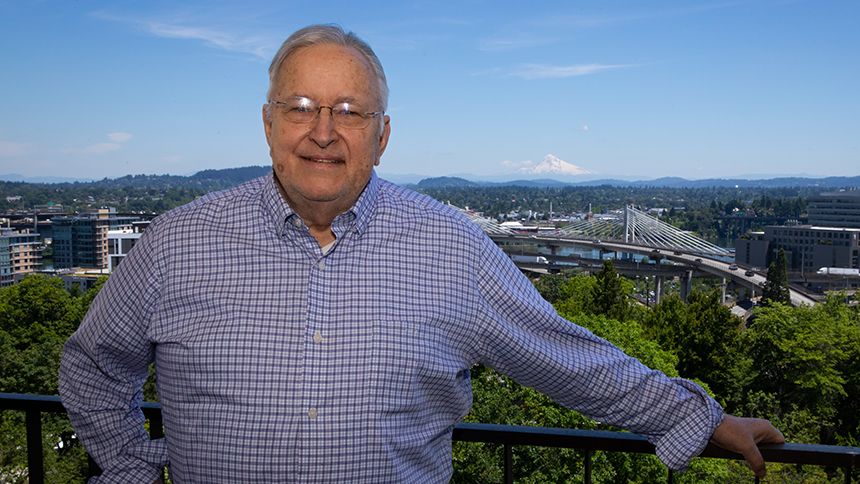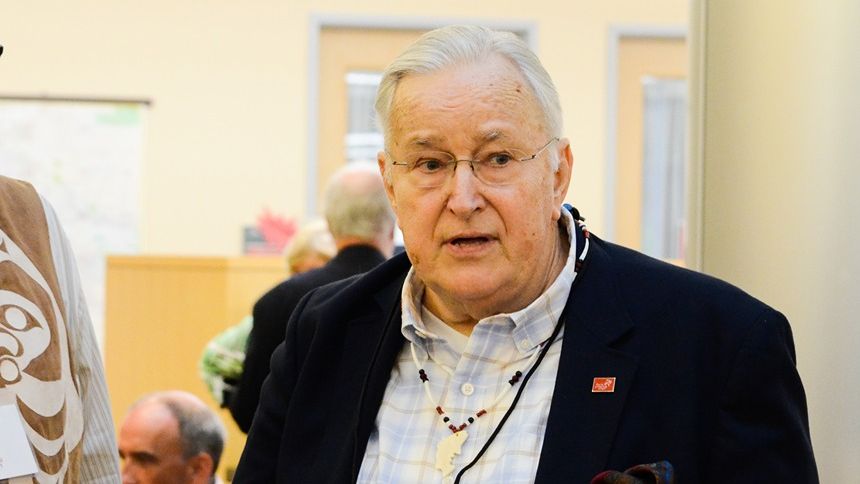Former U.S. Rep Les AuCoin (D-OR),’69, Hon. ’78, has turned over to Pacific University an extensive collection of papers documenting his life in public service. He responded by email to a set of questions from Pacific magazine’s Mike Francis about his choice to do so, issues of politics and the tenor of the political climate, as well as some personal reflections.
An essential read for anyone seeking to better understand AuCoin’s consequential public service is his memoir “Catch and Release: An Oregon Life in Politics,” published in 2019.
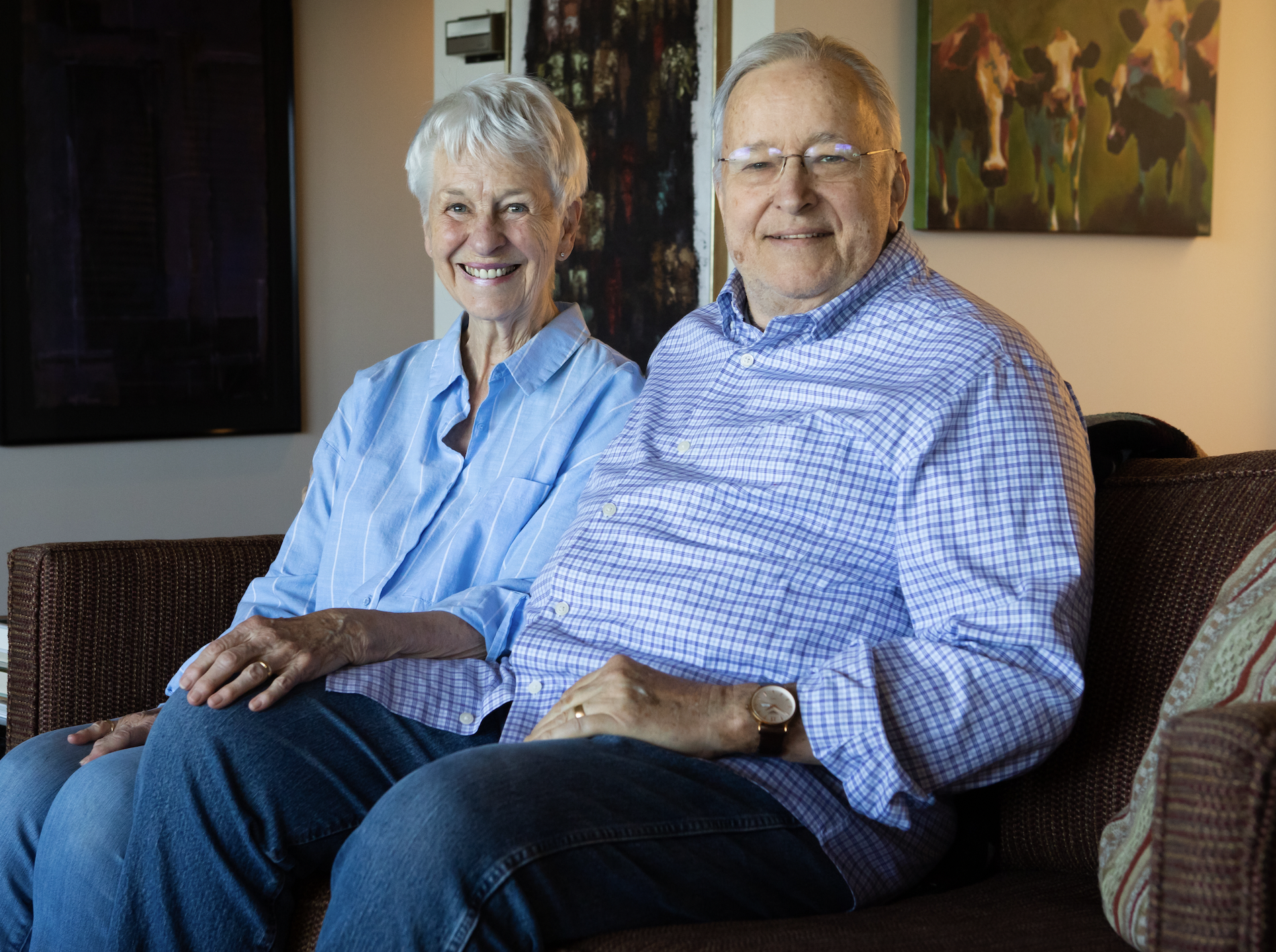
Q: Why did you decide to turn your records and papers over to Pacific? What do you hope the records will teach the public about your life of public service?
A: It’s a bit of a story, but did it because my alma mater helped form my life in several remarkable ways.
Professor Clifford Rowe helped launch my career as a writer, and former president Miller Ritchie became a surrogate father to me. Rowe, chair of the then-Journalism Department, recruited me in 1960 as a high school graduate who had been, in my high school senior year, acting sports editor of my hometown weekly, the Redmond (Oregon) Spokesman. He also got me placed in a Friday and Saturday night job in the sports department of the state’s largest paper, The Oregonian. There, that following summer, the blustery executive editor, Don McLeod, kept me on full-time as vacation relief for some of the Northwest’s most iconic sportswriters. The experience launched me as a writer and I’ve never forgotten it.
When I resumed my studies at Pacific in 1964 after a three-year hitch in the army, former university president Miller Richie hired me as the school’s public information director and editor of the magazine, Pacific Today. Compensation included tuition-free classes I needed to complete my BA and affordable rent of the house across College Way, which now houses university departments. Ritchie became the father I never had; our personal correspondence continued though my years in Congress until the end of his life. With the campus across the street, our home was perfect for Sue and me and our two children.
Considering my deep roots at Pacific, I can’t think of a more appropriate place as a home for documents from my public career.
I hope the collection will give students and researchers reason to hope even at time when our modern political life is so fraught. It doesn’t have to be this way. My history proves it.
Q: When you survey your career in Congress, it's clear you were an important voice on many things, from reproductive rights to the environment to Russia to gun control.
But today we seem to be in crisis in each one of those areas: climate catastrophes; the repeal of Roe v Wade; the war in Ukraine; the proliferation of guns. Does this make you feel hopeful? Despairing?
A: I think of hope as the oxygen of civic life. To paraphrase my hero, Vaclav Havel, poet, playwright, political dissident, and first elected president of the Czech Republic, “Hope is not the same as feeling the joy that things are going well, or a willingness to invest in work that is heading for success, but rather an ability to work for something because of its inherent truth.”
So, I used to explain to my college students that optimism is not prediction, it’s orientation. It’s trying your hardest to make the world better, even if you know you may fail. It’s to understand that, even if you fail, to attempt to improve the world is to declare who you are.
So, yes, I am hopeful, and I also acknowledge that the odds of success can seem stacked against us — all the more reason for us to both hope and act. Sitting on the sidelines guarantees that those who created the problems will have the playing field to themselves.
Q: And a related question: Could a Les AuCoin — a principled Congressman who's willing to work across the aisle — survive and thrive in Washington, D.C., in this day and age?
A: This sounds crazy as all get out, but several years after leaving the Hill, I had a recurring dream in which I, a retiree, had somehow been inserted into today’s Congress. (Do you know a good shrink?) I stood on the House floor with no right to vote, but my battle-weary colleagues pleaded for me to it anyway. Hostility was palpable compared to the relatively civil and functional Congress I knew.
As bad as my dream was, it pre-dated the arrival of Donald Trump, Kevin McCarthy, and Margorie Taylor Greene, which proves, I guess, that things can always get worse! Today, those three and their ideological allies have stretched beyond recognition the dividing line between most Democrats and Republicans. Instead of an “aisle” to work across, the divide is more like the Grand Canyon.
Liz Cheney has had the courage to span the gap, possibly at the cost of her political career. If so, she will illustrate a political truth: Sometimes the noblest act of all is to fall on your sword for a high principle. Oregon’s Wayne Morse taught me that when I first ran for Congress. He was trying to make a comeback after sacrificing his Senate career for his lonely opposition to the Vietnam War. Cheney’s sacrifice would be for nothing less than our democracy.
I would not “thrive” in today’s Congress, but I would hope for change and try like the devil to effect it. I would live up to my oath to “protect and defend” the Constitution.
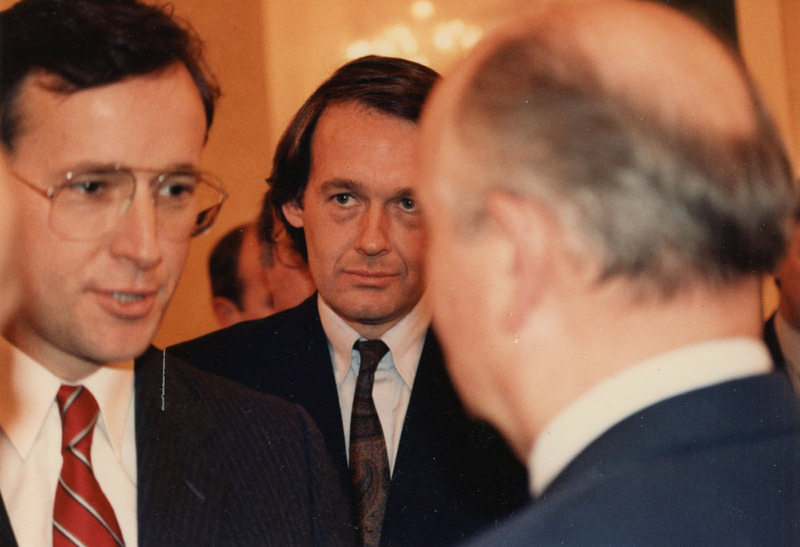
Q: People don't like politicians, according to the polls. They don't trust them to do the right thing, except for themselves.
How did we get here? Is there any chance of returning to a more respectful relationship between the people and those who represent them?
A: I get the point. One meme in circulation sums it up: “If you are not part of the solution, you're probably a politician.” I have little patience for sweeping generalizations by voters or their politicians. When someone says, “Politicians are crooks,” or “Republicans are fascists,” or “Democrats are pedophiles,” it takes but one exception to destroy their argument. Regrettably, such critical thinking is too much work for too many Americans.
Given the negativity spewed by shout radio, FOX News, and PACs, I’m amazed that so many decent people serve in public office or run for it. Are some of our pols craven? You bet. Oligarchic, too. In some cases, deranged. But then, “We the People” aren’t exactly a day at the beach!
Take the idea of compromise. At a dinner party in Portland once, a businessman said to me, “Les, why is it that after we elect good people to Congress, they just end up stooping to compromise?” I wanted to say, “Um, because we’re not ruled by a despot?”
Compromise is central to a democracy. In Congress, ideas from across the country collide against thousands of others on any given day. Nothing moves through it without “puts” and “takes” from opposing sides. Former Congressman Henry Waxman of California was a master of that process. He would propose a “whole loaf” idea, but at the end of the day, he’d settle for a single slice of bread if that was all he could get. Then, he’d come back next year for another piece, and, later, another, until he won the day. The trouble is, it’s hard in a TV commercial to rhapsodize about a single slice of bread.
As to finding our way to increase respect between the elected and we, the electors, here are three thoughts that would help. We have to eliminate unlimited dark money contributions in campaigns; the practice is corrupt. Classes in civic literacy should be graduation requirements in high school and college. And as voters, we should broaden our news diet to broaden our minds. We should include at least one news source that philosophically is at odds with our biases. I watch both PBS and FOX.
Q: You mentioned eliminating dark money, and by that you mean money contributed through opaque organizations, such as nonprofits? And donated to PACs?
Yes, hundreds of millions, given covertly and without limits.
Q: What about other things? For example, is there any hope that we will ever stop gerrymandering districts so that we have more competitive races?
Gerrymandering is a form of legalized theft against the popular will. It lets politicians choose their voters rather than voters choosing their legislators. The result is stunning. According to the blog, FiveThirtyEight, only 27 districts in the 435-seat U.S. House are truly competitive.
We can abolish gerrymandering whenever we decide to, by passing a ballot measure. In Oregon, a grassroots organization, People Not Politicians, is gathering signatures to put such a measure on the 2024 general election ballot. Incumbents are never eager to give up influence; because this remedy impowers the grassroots, the solution must come from the grassroots.
Q: Now we have a new military branch, the Space Force. Is that a necessary development, or a frightening one?
I devoted myself to ensuring against the weaponization of space. Trump created the Space Force, and Russia and China have now joined the U.S. in testing-deployment of anti-satellite weapons. This is insane and alarming because it adds to the hair-trigger posture of the superpowers. Their competition, without restraint, is bound to pull other nations into the chase.
Q: I read an interview you gave when you were about to move to Montana in which you said your proudest moment in public life was pushing through a ban on anti-satellite weapons in space over the objections of the Reagan administration.
Is that still true? That that was your proudest moment as a congressman?
No one before me or since has limited the international weapons race through a law passed by Congress — much less space weapons. So, yes, I’m very proud of my achievement. However, the anti-satellite law expired when Congress did not reauthorize it after I left.
In terms of a lasting legacy, I would give the nod to my bills that transformed life for current and future generations of Grand Ronde tribal members. The legislation restored the tribe’s federal status and gave it a strong economic base to provide healthcare, elder housing, college tuition, various social programs, and hundreds and hundreds of jobs. The Grand Ronde have risen from abject poverty to become a major economic and political player in Oregon.
Q: More than anyone else, you were the person who caused the federal government to recognize the tribes of the Grand Ronde. That recognition brought them a reservation, a logging industry and ultimately a profitable casino. What does that mean to you?
A: It warms my heart. The tribes went from near invisibility and poverty to one of the strongest Native American federations in the Northwest, both economically and politically. To get there, we faced no small amount of local bigotry and ignorance, which added sting to the federal government’s earlier betrayal — seizure of lands and nullification of their legal status as a tribe. But the Grand Ronde used the tools Congress gave them to produce hundreds of family wage jobs; financial, medical, and dental care for their members; housing for their elders; college scholarships; and even charitable grants to non-Indians residing in their ancestral lands! Those outcomes will live on into “The Seventh Generation” long after I’m gone. That’s not immortality, but it’s as close as I’m likely to get.
Q: How well do you think we European-Americans have done in compensating for the abuses committed over the centuries against native people, including, in your old district, the Grand Ronde, the Siletz, the Kalapuya (or Atfalati), the Tillamook, the Clatsop and others?
A: We haven’t done well at all. First, let’s be clear: The abuses whites inflicted on American Indians morally were close to the sin of African enslavement. Before Euro-Americans brought slave ships to America, they had already been enslaving Native Americans! Manifest Destiny treated Indian lands as “unholy” until stolen and broken by the plow; it nullified treaties with “savages,” killed thousands of innocents, and forced Native Americans to assimilate to a culture alien to thousands of years of Aboriginal life and custom. Popular opinion began to favor Native American rights in general in the ‘70s and ‘80s, but not all the sovereign rights of the Grand Ronde are in hand. Just recently, the Oregon utility, PGE, blocked access to their ancestral fishing rights at Willamette Falls, near Oregon City.
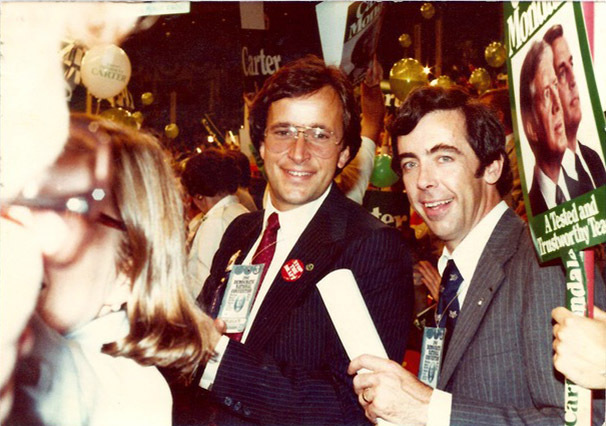
Q: I just read another poll where people say they want nothing to do with people of the other party. As red states and blue states seem to be increasingly at war, the very notion of these United States seems to be fraying. How concerned are you that the American experiment is endangered?
I’m deeply concerned. The blood sport that Newt Gingrich began has swollen into an ideological civil war. In testimony before the January 6th Committee, a retired federal circuit court judge, John Michael Luttig, a conservative, declared that U.S. democracy is on a “knife’s edge.”
I’ll never give up on my country, but I would never have imagined such a chilling judgment. Consider these evidence-free thoughts and actions:
Seventy percent of Republicans today think Joe Biden is not a legitimate president. Sixty percent regard Democrats as enemies, not political opponents. Eight senators and 139 representatives voted to object to the counting of Electoral College ballots.
Then there is this: A full year after the Capitol insurrection, nearly two in five Republicans said physical force could be used against their political opponents — more than twice the number of Democrats in the same poll.
This is a grave problem in a democracy, which depends on reason, not violence, to resolve differences. Our republic also hinges on critical thinking when searching for truth. According to social psychologists, however, the human default position is to avoid or, worse, to dig in our heels against facts that conflict with our beliefs. They call it “confirmation bias.”
Protecting democracy against such belching authoritarianism will require us to commit to a lot of things. One of them is promoting broad educational experiences that promote logical reasoning and civic literacy. The experience I got at Pacific University did just that and made clear the principles behind democratic governance and the rule of law.
Q: Could you say anything about how being a student, then an employee of Pacific U. helped position you to run that first race for the Oregon Legislature?
A: I had fabulous professors. From Miles Shishido, I developed a love of philosophy and logic. Frank Chipps and Joe Frazier brought to life both English and American history. Leigh Hunt and Eldon Hout put octane into my interest in politics and government. Bob Davies introduced me to literature and creative writing. Clifford Rowe molded a journalism wannabe into a newsman who worked for The Oregonian for several years and went on to place stories such major newspapers as the Washington Post, Louisville Courier-Journal, Nashville Banner, Rocky Mountain News, Stars & Stripes, and Army Times, among others.
Then there was Miller Ritchie, Pacific’s president, who took a chance on a 20-something U.S. Army vet and in 1966 hired me away from The Oregonian copy desk to be the university’s public information director. My compensation included free tuition for the remaining classes I needed for my bachelor’s degree. Ritchie became the father I never had; we corresponded throughout my years in Congress, with him giving me encouragement and advice until his last days. I spoke at the Ritchies’ 50th wedding anniversary at Old College Hall, and at his memorial service at the Congregational Church across from the campus on College Way.
Those years I worked at the university gave Sue and me and our children the warmth of a caring community made up of professors, students, administrators, and alums, many who remain our friends this day. Our little family rented the house across the campus now occupied by the Center for Peace and Spirituality and other Pacific offices. We hired babysitters from Warner Hall less than a block away. When I worked late at my office on the third floor of Marsh Hall, Sue and the kids would in time come over to throw pebbles up at my window. I would toss down keys to the building, and they’d hang out with me while I buttoned up my work. Then we would walk back through the oaks to our home, our first house, with a yard of our own.
In 1968, with our son and daughter settled into friendships and preschool, Sue and I helped manage the successful Washington County campaign of anti-war Sen. Gene McCarthy. Quite a few faculty, faculty wives, and students volunteered. In 1970, my McCarthy experience led folks to encourage me to run for the Oregon House. I did and I won with the help of my friend and fellow journalism alum, Bob Crane ’66, who managed my campaign and later became my congressional chief of staff. Ours was the first successful state House race for a Washington Democrat since FDR’s reelection landslide in 1936.
Sue and I well remember our Pacific years.
